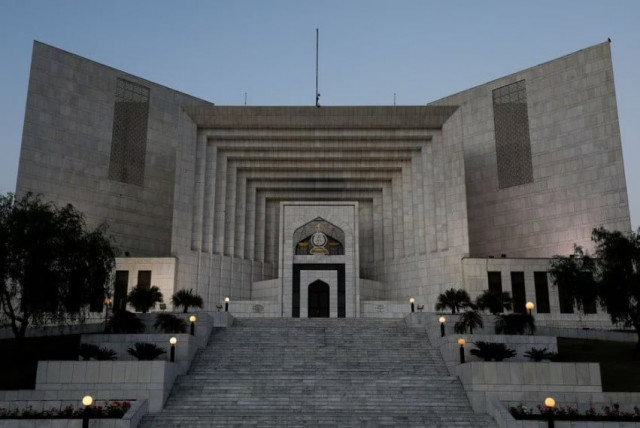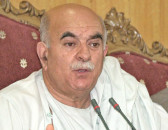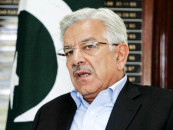SC will soon lack judge with criminal law expertise
Justice Masood, who is set to retire this week, dealt with such cases

After the retirement of Justice Sardar Tariq Masood this week, the Supreme Court will require a judge having expertise in dealing with hardcore criminal cases.
More than 3,000 jail petitions are pending in the apex court, while around 1,000 criminal appeals are awaiting their final adjudication.
Thousands of accused are languishing in jails but their petitions are yet to be listed.
Currently, the top court is hearing jail petitions, which were filed in 2019.
It has been learnt that mostly bail matters were being listed before the bench led by Justice Masood these days.
During the tenure of former Chief of Pakistan Asif Saeed Khosa, two benches were hearing criminal cases.
Former CJP Khosa had decided two decades of old criminal appeals and jail petitions.
Last time, ex-CJP Umar Ata Bandial formed a bench led by former SC judge Mazahar Ali Akbar Naqvi to hear jail petitions. That bench also included Justices Jamal Khan Mandokhail and Athar Minallah.
However, that bench could not function after the emergence of the audio leak about the conversation between ex-judge Naqvi and former Punjab chief minister Pervez Elahi.
Incumbent CJP Qazi Faez Isa has so far not evolved any strategy for the expeditious disposal of jail petitions.
Advocate Ayesha Tasleem, who has been appointed as state counsel to represent convicted people, has confirmed that unlike in the past, jail petitions and criminal appeals were not being scheduled before the apex court.
She revealed that her two clients had died in jail before their petitions could be scheduled.
Tasleem believed that a permanent bench should be formed to hear jail petitions and criminal appeals.
Similarly, no Shariat appellate bench of the SC has been formed for the last couple of years.
During the last five years, ex-CJP Bandial, Justice (retd) Mazoor Ahmad Malik, Justice Sardar Tariq Masood and former judge Mazahar Ali Akbar Naqvi headed the benches hearing hardcore criminal cases.
However, Justice Mansoor Ali Shah in his decisions has also evolved jurisprudence on the criminal side.
After Justice Masood’ s retirement, the Judicial Commission of Pakistan (JCP) is required to nominate a high court judge, who is well-versed in criminal laws.
Three seats in the SC will be vacant following his retirement.
No ad-hoc judge can be appointed until permanent seats are filled.
The superior bars are against the appointment of ad-hoc judges. However, now there is cordial relationship between CJP Isa and the superior bars led by the Independent Group. The legal fraternity is urging CJP Isa to focus on judicial reforms.
Justice Masood’s retirement
A full court reference will be organised in Justice Masood’s honour on March 8.
Justice Masood was appointed as a Lahore High Court judge in September 2009. He was elevated to the SC in November 2015 before his appointment as the LHC chief justice.
In September 2021, he was appointed as a member of the JCP.
Justice Masood has always strongly advocated the seniority principle in the appointment of SC judges.
He and CJP Isa have opposed the appointment of junior high court judges to the SC during JCP meetings.
They were both against the appointment of serving SC judges including Justices Ayesha Malik, Hasan Azhar Rizvi and Shahid Waheed.
These judges were nominated by ex-CJP Bandial.
Justice Masood also supported CJP Isa in difficult times.
However, he has been criticised to allow the trials of civilians in military courts.
Later, he opted to recuse himself from the larger bench hearing the government's intra-court appeals against the judgement declaring that the trials of civilians in military courts was unconstitutional.
Justice Masood was heading the bench, which granted bail to PTI founding chairman Imran Khan and Shah Mahmood Qureshi in the cipher case.
A three-judge bench led by Justice Masood grilled the Election Commission of Pakistan (ECP) for not a providing level playing field to the PTI in the run-up to February 8 general polls.
Lawyer Abdul Moiz Jaferii believed that the best judges were those who could tackle core constitutional and taxation issues.
He added that even those judges who were not very comfortable with numbers but understood civil procedure and evidence did quite well.
“Everyone left over is known as a criminal law expert."
Jaferii said Justice Masood was a criminal law expert.
“His greatest legacy in [in this connection] will be how he led a bench which suspended a judgment declaring civilian trials by the military under the Army Act illegal and then delaying the issue by deciding to recuse himself from hearing the case while those who could benefit from this decision stayed imprisoned,” he elaborated.
“He goes home today. The people who remain detained because of his judicial maneuvering saw little of his criminal law expertise."
The other notable act that he did was to side with CJP Isa when he could have become the top judge himself.
“He did the right thing, and at the time it looked like he did it for the greater good. In our recent history we have had nearly every prominent judge accused of selfishness. In such company, justice Masood’s defiance and selflessness stands out. If he had left it at that, perhaps it would have been good enough,” Jaferii added.



















COMMENTS
Comments are moderated and generally will be posted if they are on-topic and not abusive.
For more information, please see our Comments FAQ